Examining the Book of Isaiah 2
Mike Ervin

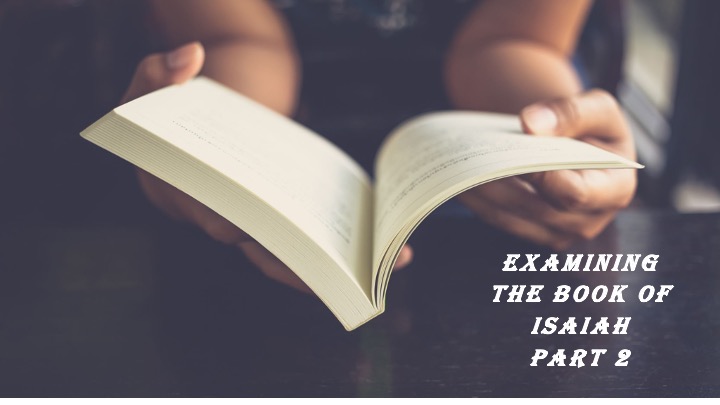

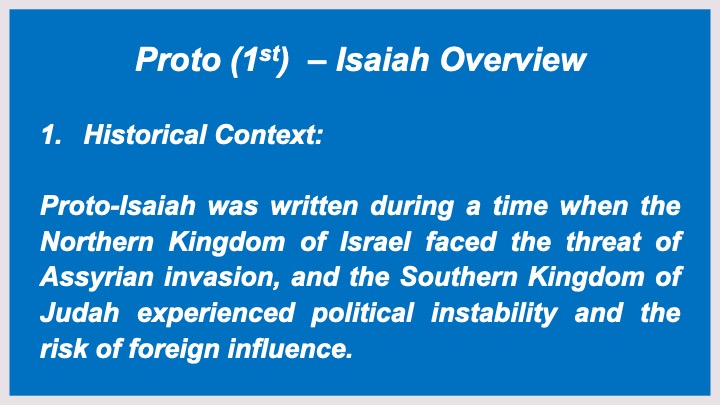
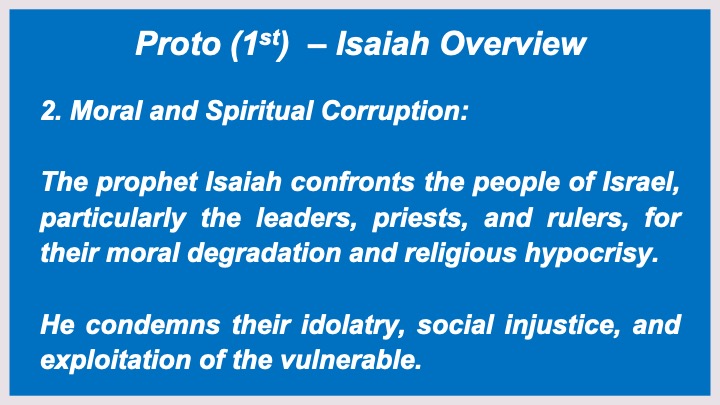
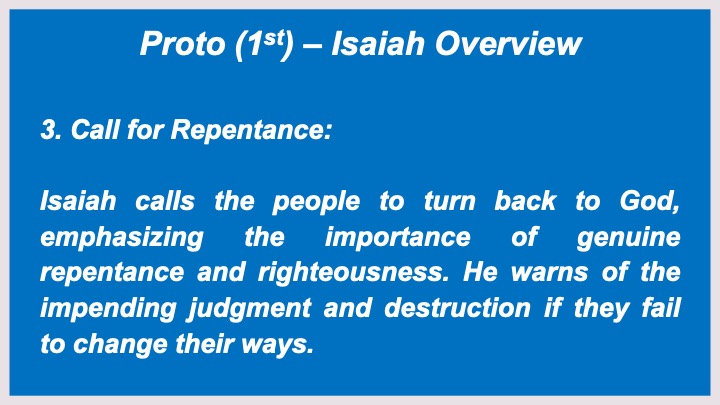
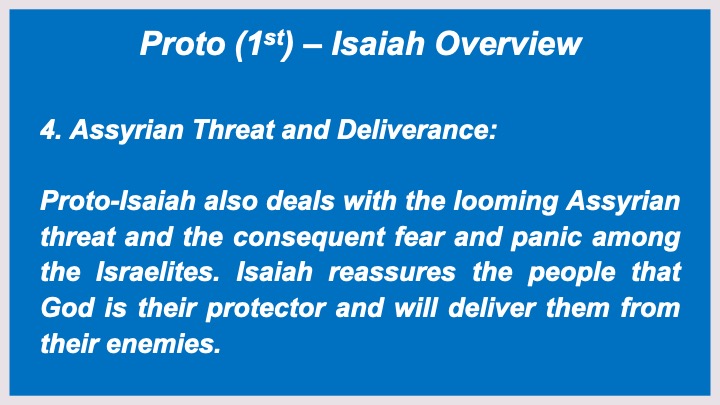
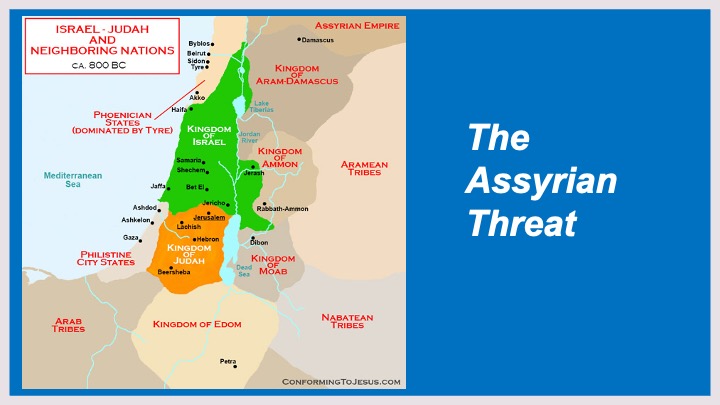
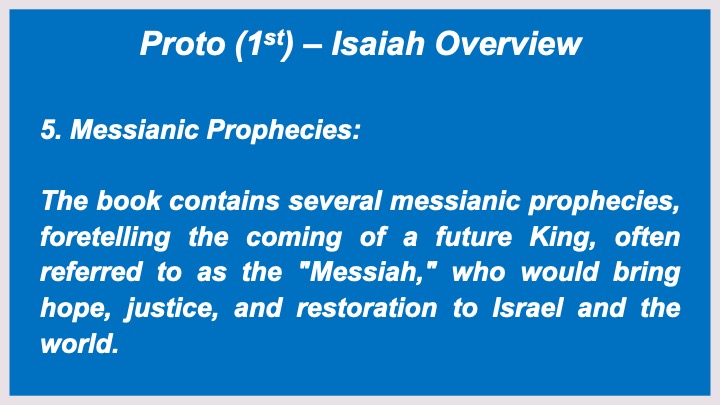
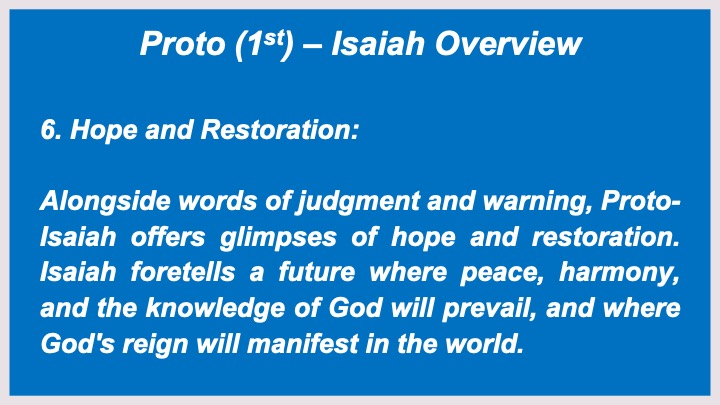
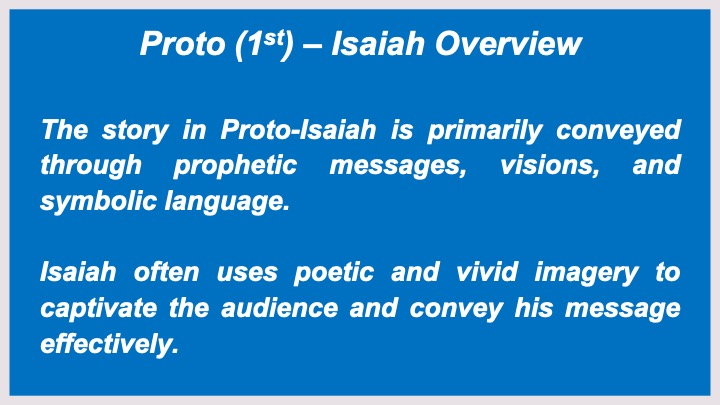
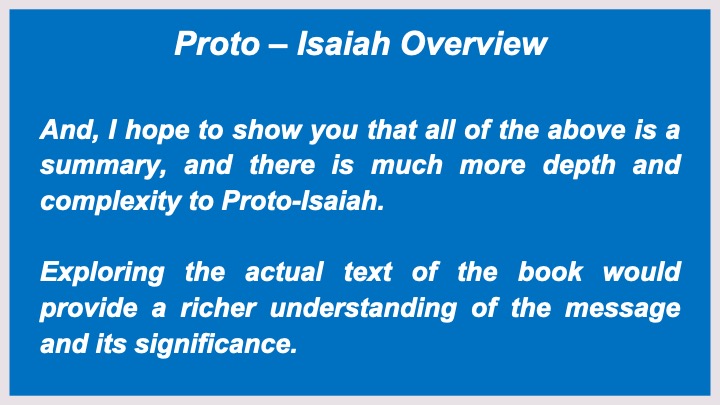
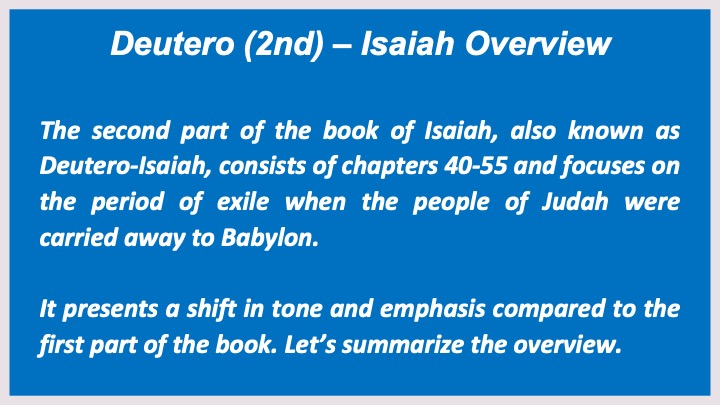
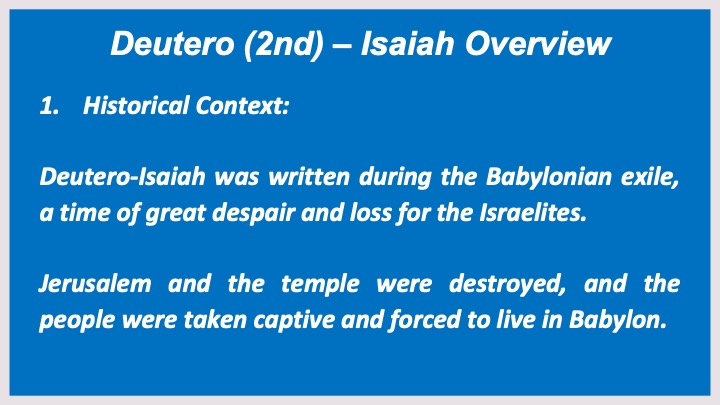
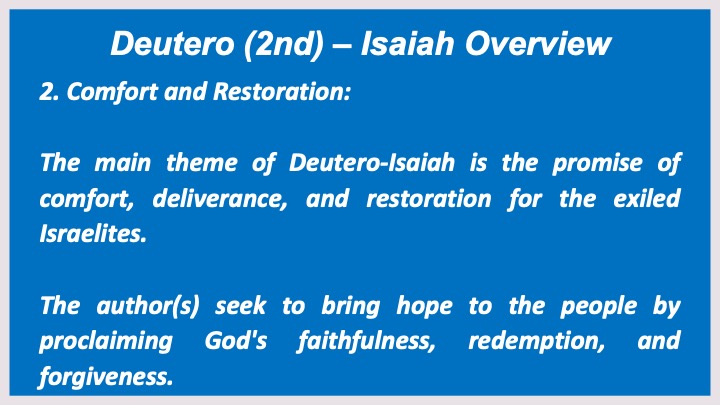
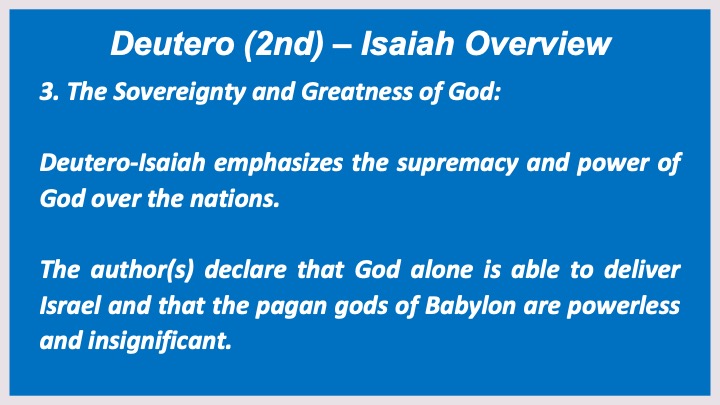
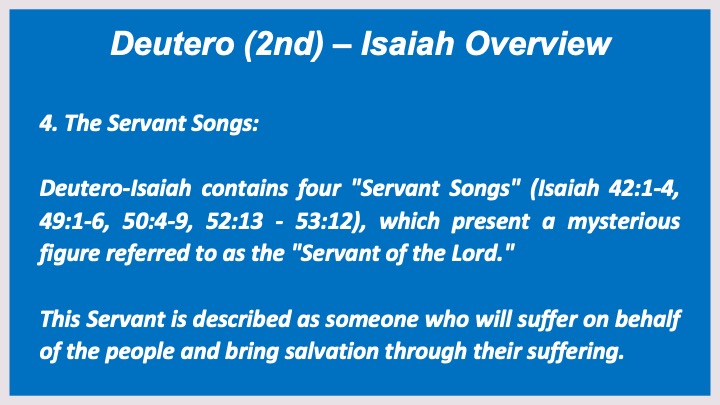
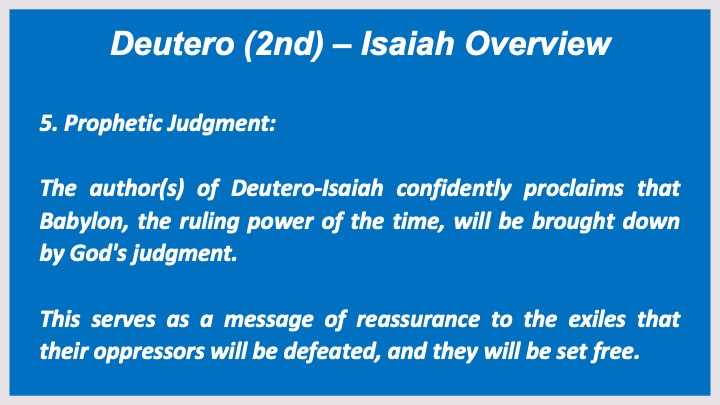
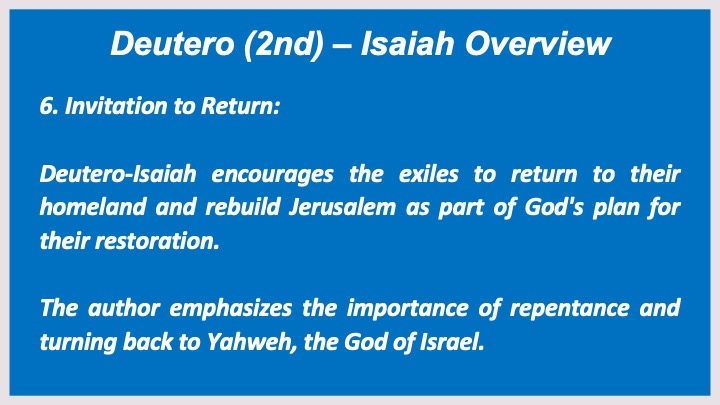
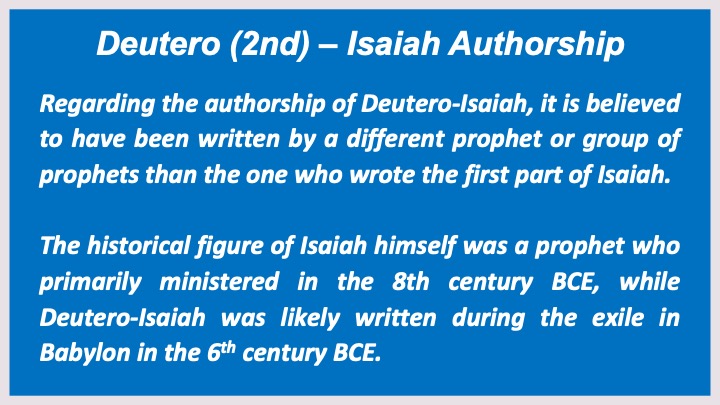
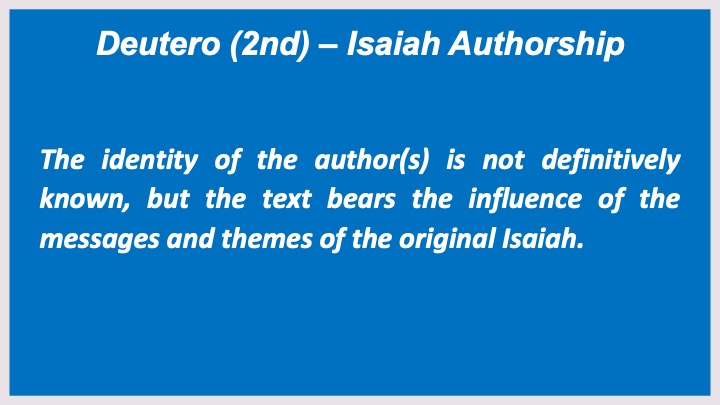
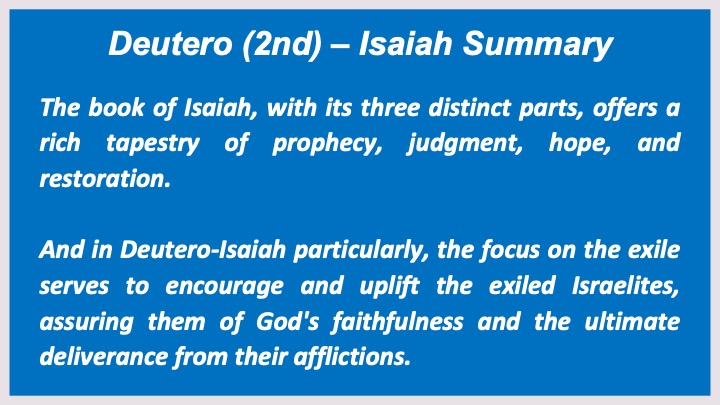
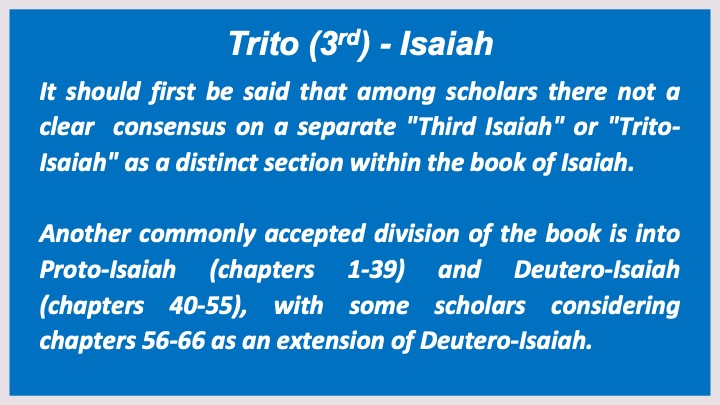
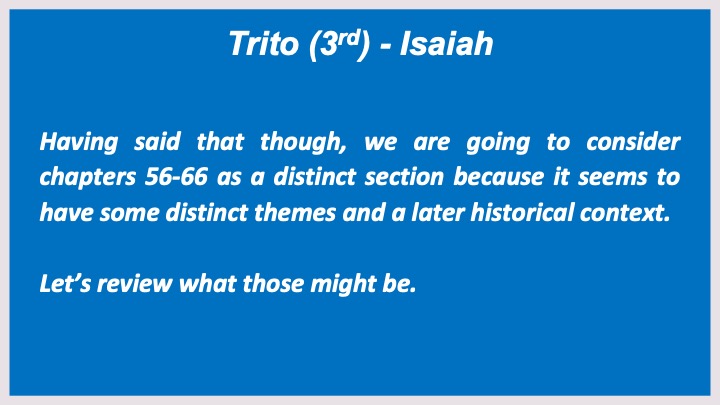
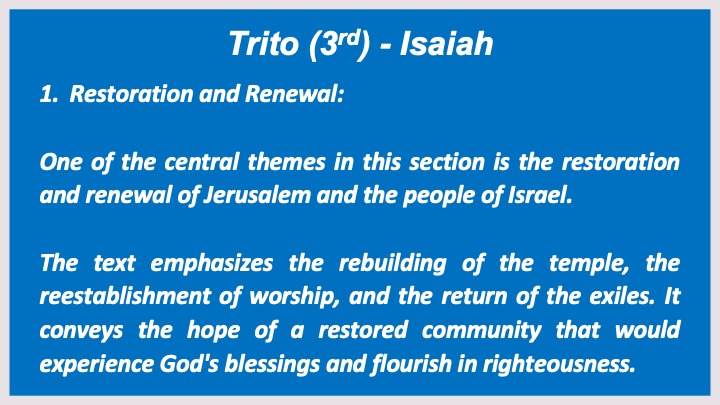
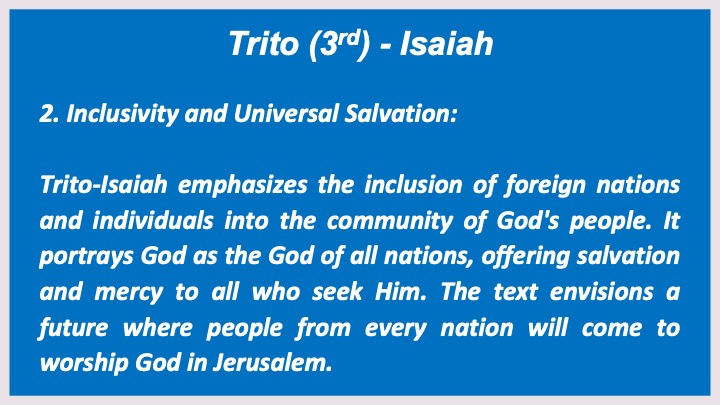
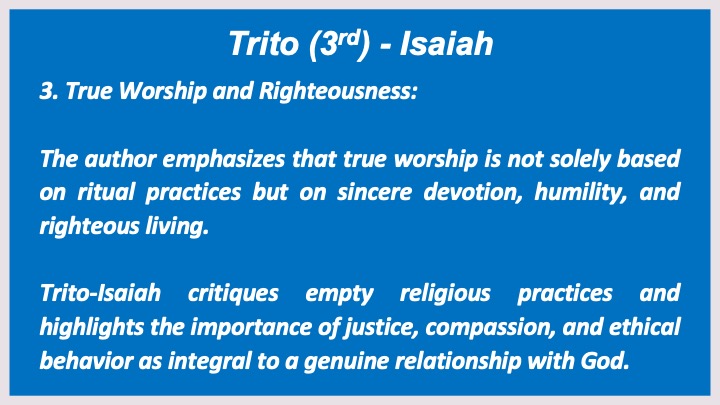
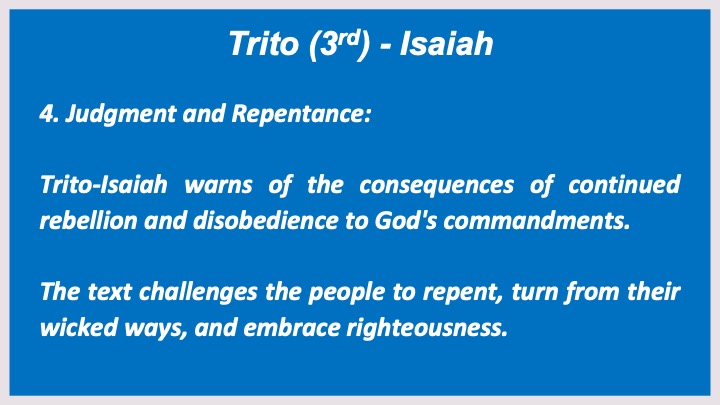
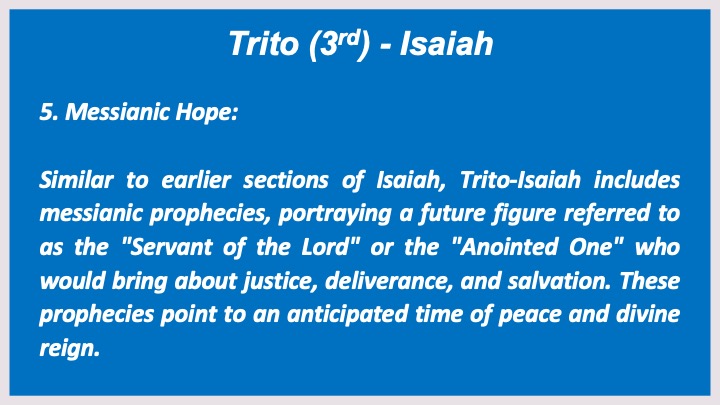
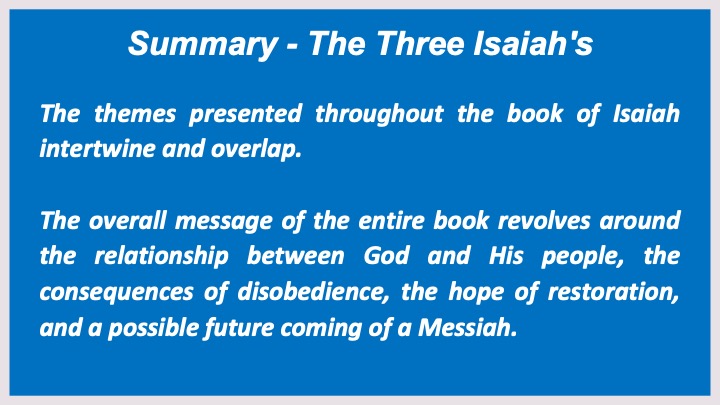
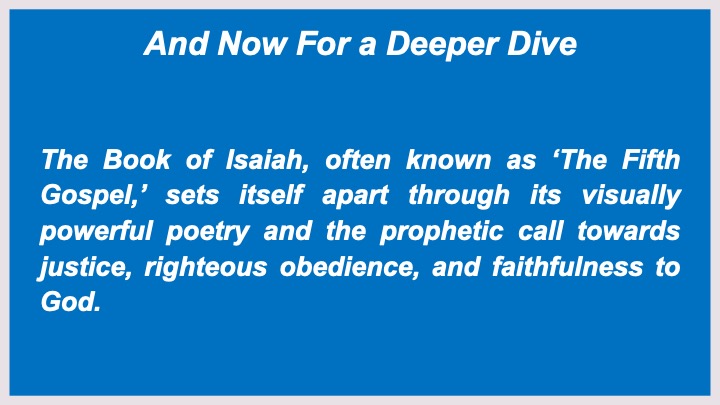
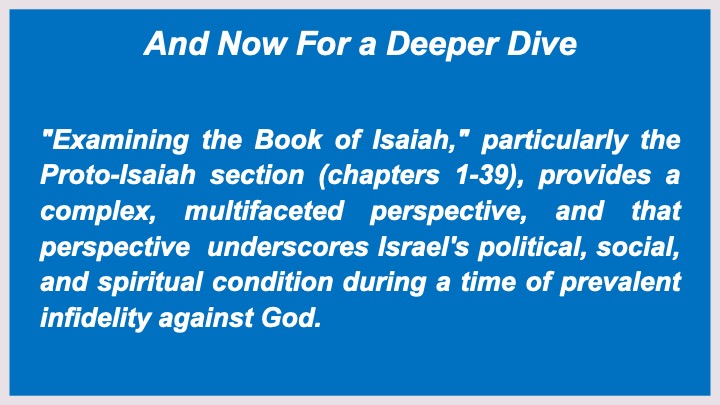
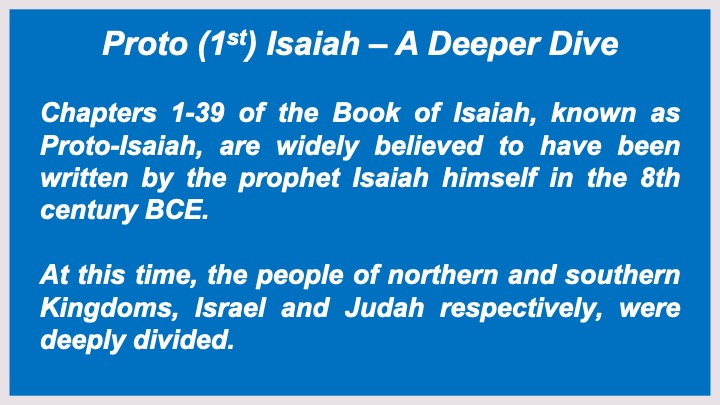
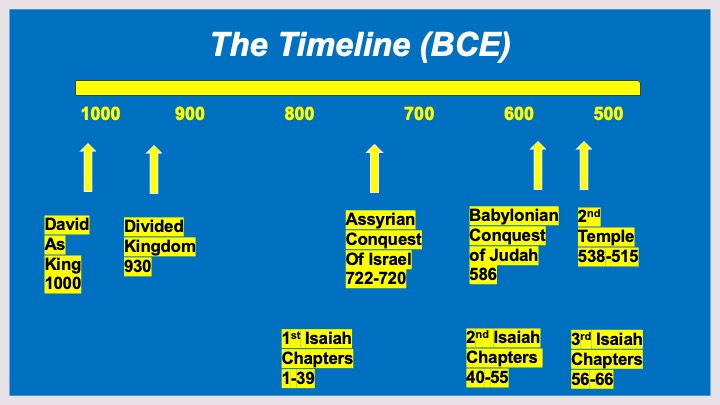
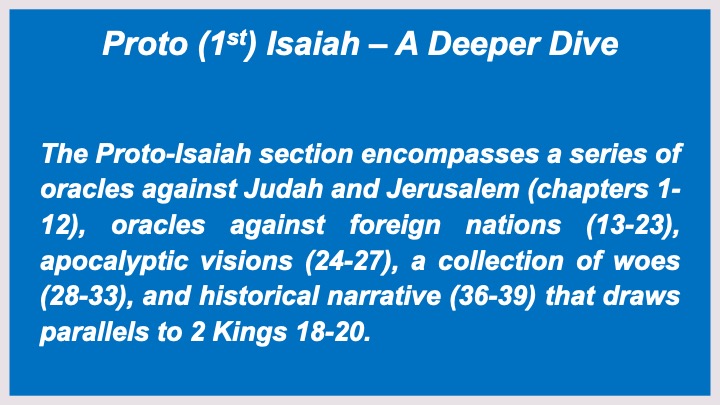
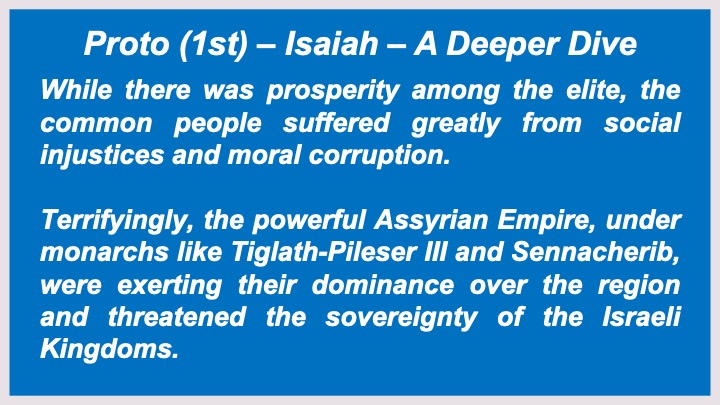
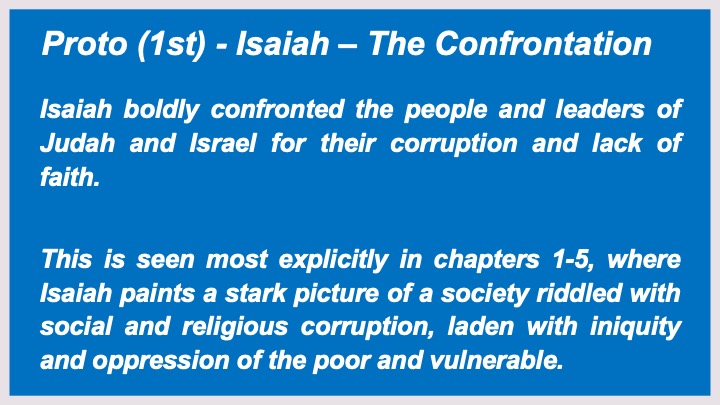

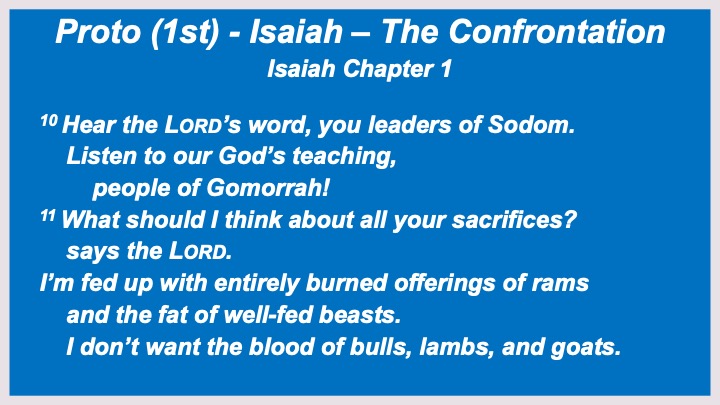
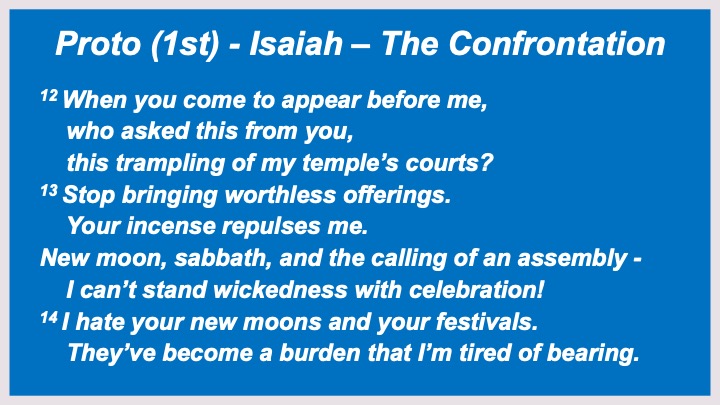
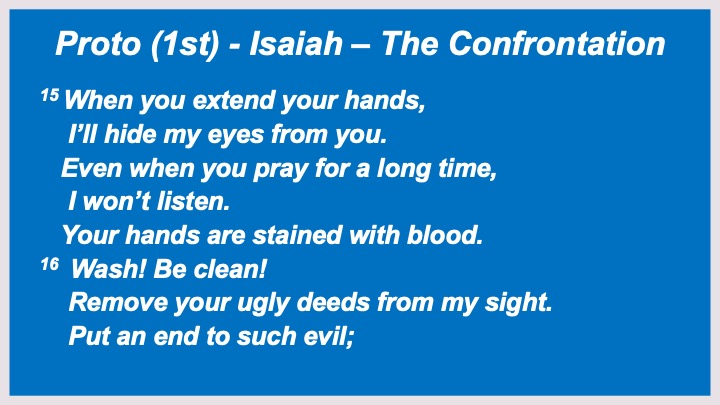
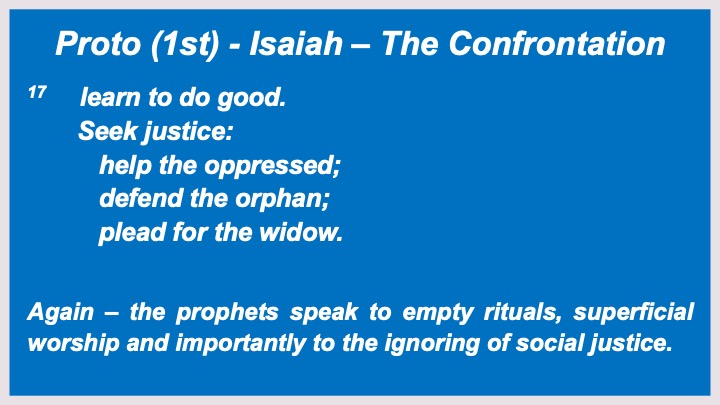
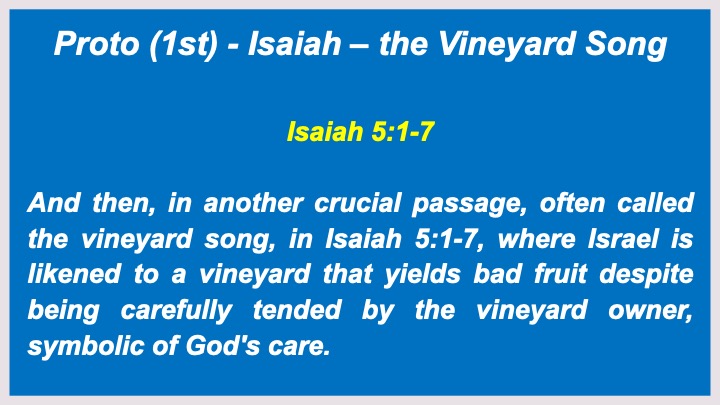
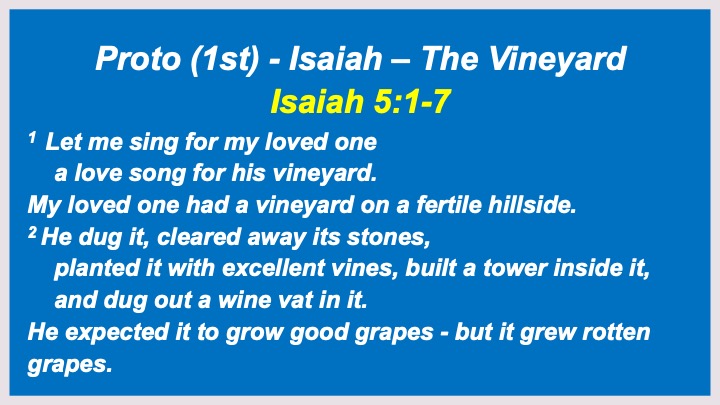
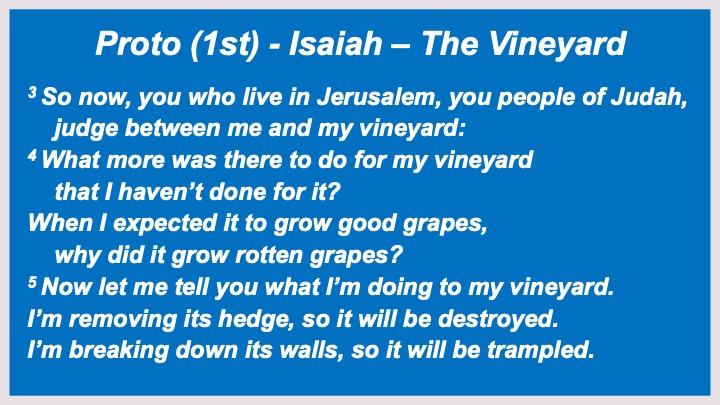
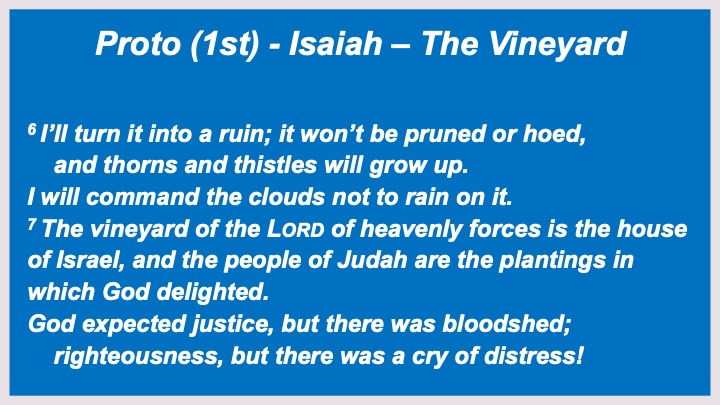
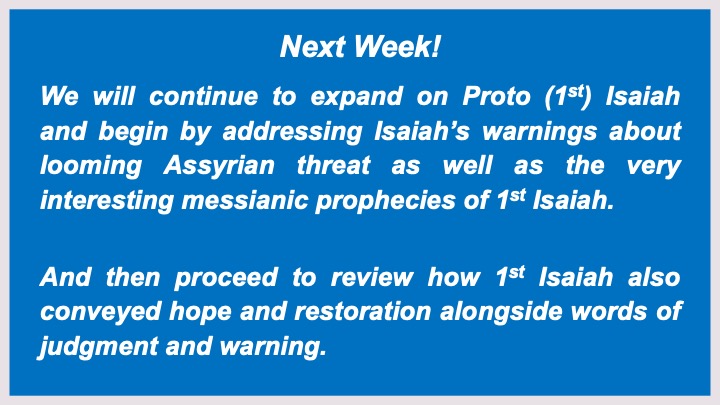
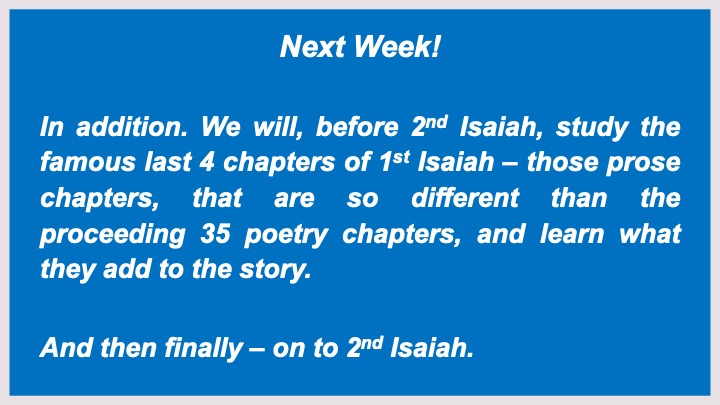
Examining the Book of Isaiah 2 - Text
Proto (1st) – Isaiah Overview
- Historical Context:
Proto-Isaiah was written during a time when the Northern Kingdom of Israel faced the threat of Assyrian invasion, and the Southern Kingdom of Judah experienced political instability and the risk of foreign influence.
2. Moral and Spiritual Corruption:
The prophet Isaiah confronts the people of Israel, particularly the leaders, priests, and rulers, for their moral degradation and religious hypocrisy.
He condemns their idolatry, social injustice, and exploitation of the vulnerable.
3. Call for Repentance:
Isaiah calls the people to turn back to God, emphasizing the importance of genuine repentance and righteousness. He warns of the impending judgment and destruction if they fail to change their ways.
4. Assyrian Threat and Deliverance:
Proto-Isaiah also deals with the looming Assyrian threat and the consequent fear and panic among the Israelites. Isaiah reassures the people that God is their protector and will deliver them from their enemies.
5. Messianic Prophecies:
The book contains several messianic prophecies, foretelling the coming of a future King, often referred to as the "Messiah," who would bring hope, justice, and restoration to Israel and the world.
6. Hope and Restoration:
Alongside words of judgment and warning, Proto-Isaiah offers glimpses of hope and restoration. Isaiah foretells a future where peace, harmony, and the knowledge of God will prevail, and where God's reign will manifest in the world.
The story in Proto-Isaiah is primarily conveyed through prophetic messages, visions, and symbolic language.
Isaiah often uses poetic and vivid imagery to captivate the audience and convey his message effectively.
And, I hope to show you that all of the above is a summary, and there is much more depth and complexity to Proto-Isaiah.
Exploring the actual text of the book would provide a richer understanding of the message and its significance.
Deutero (2nd) – Isaiah Overview
The second part of the book of Isaiah, also known as Deutero-Isaiah, consists of chapters 40-55 and focuses on the period of exile when the people of Judah were carried away to Babylon.
It presents a shift in tone and emphasis compared to the first part of the book. Let’s summarize the overview.
- Historical Context:
Deutero-Isaiah was written during the Babylonian exile, a time of great despair and loss for the Israelites.
Jerusalem and the temple were destroyed, and the people were taken captive and forced to live in Babylon.
2. Comfort and Restoration:
The main theme of Deutero-Isaiah is the promise of comfort, deliverance, and restoration for the exiled Israelites.
The author(s) seek to bring hope to the people by proclaiming God's faithfulness, redemption, and forgiveness.
3. The Sovereignty and Greatness of God:
Deutero-Isaiah emphasizes the supremacy and power of God over the nations.
The author(s) declare that God alone is able to deliver Israel and that the pagan gods of Babylon are powerless and insignificant.
4. The Servant Songs:
Deutero-Isaiah contains four "Servant Songs" (Isaiah 42:1-4, 49:1-6, 50:4-9, 52:13 - 53:12), which present a mysterious figure referred to as the "Servant of the Lord."
This Servant is described as someone who will suffer on behalf of the people and bring salvation through their suffering.
5. Prophetic Judgment:
The author(s) of Deutero-Isaiah confidently proclaims that Babylon, the ruling power of the time, will be brought down by God's judgment.
This serves as a message of reassurance to the exiles that their oppressors will be defeated, and they will be set free.
6. Invitation to Return:
Deutero-Isaiah encourages the exiles to return to their homeland and rebuild Jerusalem as part of God's plan for their restoration.
The author emphasizes the importance of repentance and turning back to Yahweh, the God of Israel.
Regarding the authorship of Deutero-Isaiah, it is believed to have been written by a different prophet or group of prophets than the one who wrote the first part of Isaiah.
The historical figure of Isaiah himself was a prophet who primarily ministered in the 8th century BCE, while Deutero-Isaiah was likely written during the exile in Babylon in the 6th century BCE.
Deutero (2nd) – Isaiah Authorship
The identity of the author(s) is not definitively known, but the text bears the influence of the messages and themes of the original Isaiah.
Deutero (2nd) – Isaiah Summary
The book of Isaiah, with its three distinct parts, offers a rich tapestry of prophecy, judgment, hope, and restoration.
And in Deutero-Isaiah particularly, the focus on the exile serves to encourage and uplift the exiled Israelites, assuring them of God's faithfulness and the ultimate deliverance from their afflictions.
Trito (3rd) – Isaiah
It should first be said that among scholars there not a clear consensus on a separate "Third Isaiah" or "Trito-Isaiah" as a distinct section within the book of Isaiah.
Another commonly accepted division of the book is into Proto-Isaiah (chapters 1-39) and Deutero-Isaiah (chapters 40-55), with some scholars considering chapters 56-66 as an extension of Deutero-Isaiah.
Having said that though, we are going to consider chapters 56-66 as a distinct section because it seems to have some distinct themes and a later historical context.
Let’s review what those might be.
- Restoration and Renewal:
One of the central themes in this section is the restoration and renewal of Jerusalem and the people of Israel.
The text emphasizes the rebuilding of the temple, the reestablishment of worship, and the return of the exiles. It conveys the hope of a restored community that would experience God's blessings and flourish in righteousness.
2. Inclusivity and Universal Salvation:
Trito-Isaiah emphasizes the inclusion of foreign nations and individuals into the community of God's people. It portrays God as the God of all nations, offering salvation and mercy to all who seek Him. The text envisions a future where people from every nation will come to worship God in Jerusalem.
3. True Worship and Righteousness:
The author emphasizes that true worship is not solely based on ritual practices but on sincere devotion, humility, and righteous living.
Trito-Isaiah critiques empty religious practices and highlights the importance of justice, compassion, and ethical behavior as integral to a genuine relationship with God.
4. Judgment and Repentance:
Trito-Isaiah warns of the consequences of continued rebellion and disobedience to God's commandments.
The text challenges the people to repent, turn from their wicked ways, and embrace righteousness.
5. Messianic Hope:
Similar to earlier sections of Isaiah, Trito-Isaiah includes messianic prophecies, portraying a future figure referred to as the "Servant of the Lord" or the "Anointed One" who would bring about justice, deliverance, and salvation. These prophecies point to an anticipated time of peace and divine reign.
Summary - The Three Isaiah's
The themes presented throughout the book of Isaiah intertwine and overlap.
The overall message of the entire book revolves around the relationship between God and His people, the consequences of disobedience, the hope of restoration, and a possible future coming of a Messiah.
And Now For a Deeper Dive – first into 1st Isaiah
The Book of Isaiah, often known as ‘The Fifth Gospel,’ sets itself apart through its visually powerful poetry and the prophetic call towards justice, righteous obedience, and faithfulness to God.
"Examining the Book of Isaiah," particularly the Proto-Isaiah section (chapters 1-39), provides a complex, multifaceted perspective, and that perspective underscores Israel's political, social, and spiritual condition during a time of prevalent infidelity against God.
The Proto-Isaiah section encompasses a series of oracles against Judah and Jerusalem (chapters 1-12), oracles against foreign nations (13-23), apocalyptic visions (24-27), a collection of woes (28-33), and historical narrative (36-39) that draws parallels to 2 Kings 18-20.
While there was prosperity among the elite, the common people suffered greatly from social injustices and moral corruption.
Terrifyingly, the powerful Assyrian Empire, under monarchs like Tiglath-Pileser III and Sennacherib, were exerting their dominance over the region and threatened the sovereignty of the Israeli Kingdoms.
Proto (1st) - Isaiah – The Confrontation
Isaiah boldly confronted the people and leaders of Judah and Israel for their corruption and lack of faith.
This is seen most explicitly in chapters 1-5, where Isaiah paints a stark picture of a society riddled with social and religious corruption, laden with iniquity and oppression of the poor and vulnerable.
The prophet points to their empty religious rituals, criticizing their superficial worship and ignoring of social justice (Isaiah 1:10-17).
His confrontation is not merely a critique of their behavior, but also a plea for profound repentance and a return to right relationship with God, characterized by "doing right, seeking justice, and defending the oppressed."
Isaiah Chapter 1
10 Hear the Lord’s word, you leaders
of Sodom.
Listen to our God’s teaching,
people of Gomorrah!
11 What should I think about all your sacrifices?
says the Lord.
I’m fed up with entirely burned offerings of rams
and the fat of well-fed beasts.
I don’t want the blood of bulls, lambs, and goats.
12 When you come to appear before me,
who asked this from you,
this trampling of my temple’s courts?
13 Stop bringing worthless offerings.
Your incense repulses me.
New moon, sabbath, and the calling of an assembly -
I can’t stand wickedness with celebration!
14 I hate your new moons and your festivals.
They’ve become a burden that I’m tired of bearing.
15 When you extend your hands,
I’ll hide my eyes from you.
Even when you pray for a long time,
I won’t listen.
Your hands are stained with blood.
16 Wash! Be clean!
Remove your ugly deeds from my sight.
Put an end to such evil;
17 learn to do
good.
Seek justice:
help the
oppressed;
defend the
orphan;
plead for
the widow.
Again – the prophets speak to empty rituals, superficial worship and importantly to the ignoring of social justice.
Proto (1st) - Isaiah – the Vineyard Song
Isaiah 5:1-7
And then, in another crucial passage, often called the vineyard song, in Isaiah 5:1-7, where Israel is likened to a vineyard that yields bad fruit despite being carefully tended by the vineyard owner, symbolic of God's care.
1 Let
me sing for my loved one
a love song for his vineyard.
My loved one had a vineyard on a fertile hillside.
2 He dug it, cleared away its stones,
planted it with excellent vines, built a tower
inside it,
and dug out a wine vat in it.
He expected it to grow good grapes - but it grew rotten grapes.
3 So now, you who live in Jerusalem,
you people of Judah,
judge between me and my vineyard:
4 What more was there to do for my vineyard
that I haven’t done for it?
When I expected it to grow good grapes,
why did it grow rotten grapes?
5 Now let me tell you what I’m doing to my vineyard.
I’m removing its hedge, so it will be destroyed.
I’m breaking down its walls, so it will be trampled.
6 I’ll turn it into a ruin; it
won’t be pruned or hoed,
and thorns and thistles will grow up.
I will command the clouds not to rain on it.
7 The vineyard of the Lord of heavenly forces is the
house of Israel, and the people of Judah are the plantings in which God
delighted.
God expected justice, but there was bloodshed;
righteousness, but there was a cry of distress!
Next Week!
We will continue to expand on Proto (1st) Isaiah and begin by addressing Isaiah’s warnings about looming Assyrian threat as well as the very interesting messianic prophecies of 1st Isaiah.
And then proceed to review how 1st Isaiah also conveyed hope and restoration alongside words of judgment and warning.
In addition. We will, before 2nd Isaiah, study the famous last 4 chapters of 1st Isaiah – those prose chapters, that are so different than the proceeding 35 poetry chapters, and learn what they add to the story.
And then finally – on to 2nd Isaiah.